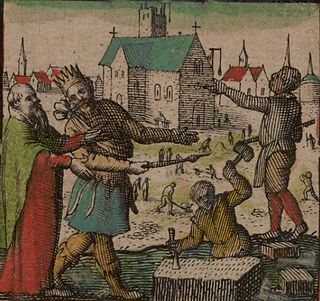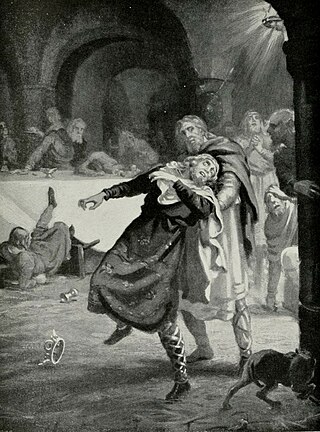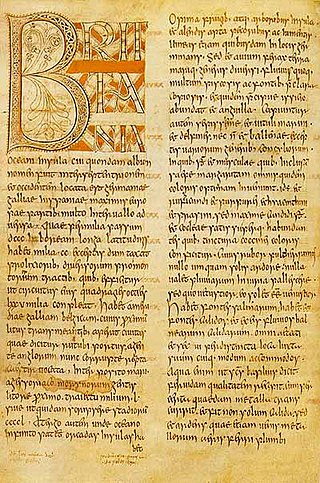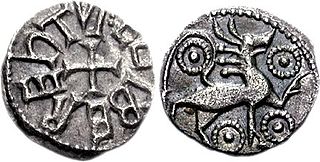Related Research Articles

Bede, also known as Saint Bede, The Venerable Bede, and Bede the Venerable, was an English monk and an author and scholar. He was one of the greatest teachers and writers during the Early Middle Ages, and his most famous work, Ecclesiastical History of the English People, gained him the title "The Father of English History". He served at the monastery of St Peter and its companion monastery of St Paul in the Kingdom of Northumbria of the Angles.

Bretwalda is an Old English word. The first record comes from the late 9th-century Anglo-Saxon Chronicle. It is given to some of the rulers of Anglo-Saxon kingdoms from the 5th century onwards who had achieved overlordship of some or all of the other Anglo-Saxon kingdoms. It is unclear whether the word dates back to the 5th century and was used by the kings themselves or whether it is a later, 9th-century, invention. The term bretwalda also appears in a 10th-century charter of Æthelstan. The literal meaning of the word is disputed and may translate to either 'wide-ruler' or 'Britain-ruler'.

Northumbria was an early medieval Anglo-Saxon kingdom in what is now Northern England and south-east Scotland.

Wulfhere or Wulfar was King of Mercia from 658 until 675 AD. He was the first Christian king of all of Mercia, though it is not known when or how he converted from Anglo-Saxon paganism. His accession marked the end of Oswiu of Northumbria's overlordship of southern England, and Wulfhere extended his influence over much of that region. His campaigns against the West Saxons led to Mercian control of much of the Thames valley. He conquered the Isle of Wight and the Meon valley and gave them to King Æthelwealh of the South Saxons. He also had influence in Surrey, Essex, and Kent. He married Eormenhild, the daughter of King Eorcenberht of Kent.
Coenred was king of Mercia from 704 to 709. Mercia was an Anglo-Saxon kingdom in the English Midlands. He was a son of the Mercian king Wulfhere, whose brother Æthelred succeeded to the throne in 675 on Wulfhere's death. In 704, Æthelred abdicated in favour of Coenred to become a monk.

Sæberht, Saberht or Sæbert was an Anglo-Saxon King of Essex, in succession of his father King Sledd. He is known as the first East Saxon king to have been converted to Christianity.

Ceolred was king of Mercia from 709 to 716.

The Battle of Heavenfield was fought in 633 or 634 between a Northumbrian army under Oswald of Bernicia and a Welsh army under Cadwallon ap Cadfan of Gwynedd. The battle resulted in a decisive Northumbrian victory. The Annales Cambriae record the battle as Bellum Cantscaul in 631. Bede referred to it as the Battle of Deniseburna near Hefenfelth.
Æthelhere was King of East Anglia from 653 or 654 until his death. He was a member of the ruling Wuffingas dynasty and one of three sons of Eni to rule East Anglia as Christian kings. He was a nephew of Rædwald, who was the first of the Wuffingas of which more than a name is known.

Aldfrith was king of Northumbria from 685 until his death. He is described by early writers such as Bede, Alcuin and Stephen of Ripon as a man of great learning. Some of his works and some letters written to him survive. His reign was relatively peaceful, marred only by disputes with Bishop Wilfrid, a major figure in the early Northumbrian church.

Cynegils was King of Wessex from c. 611 to c. 642. Cynegils is traditionally considered to have been King of Wessex, even though the kingdoms of the Heptarchy had not yet formed from the patchwork of smaller kingdoms in his lifetime. The later kingdom of Wessex was centred on the counties of Hampshire, Dorset, Somerset and Wiltshire but the evidence of the Anglo-Saxon Chronicle is that the kingdom of Cynegils was located on the upper River Thames, extending into northern Wiltshire and Somerset, southern Gloucestershire and Oxfordshire, and western Berkshire, with Dorchester-on-Thames as one of the major royal sites. This region, probably connected to the early tribal grouping known as the Gewisse, a term used by Bede for the West Saxons, lay on the frontier between the later kingdoms of Wessex and Mercia.

The Ecclesiastical History of the English People, written by Bede in about AD 731, is a history of the Christian Churches in England, and of England generally; its main focus is on the conflict between the pre-Schism Roman Rite and Celtic Christianity. It was composed in Latin, and is believed to have been completed in 731 when Bede was approximately 59 years old. It is considered one of the most important original references on Anglo-Saxon history, and has played a key role in the development of an English national identity.
Ecgberht was an Anglo-Saxon monk of Northumbria. After studying at Lindisfarne and Rath Melsigi, he spent his life travelling among monasteries in northern Britain and around the Irish Sea. He was instrumental in the establishment of Wihtberht's mission to Frisia.
Ecgric was a king of East Anglia, the independent Anglo-Saxon kingdom that today includes the English counties of Norfolk and Suffolk. He was a member of the ruling Wuffingas dynasty, but his relationship with other known members of the dynasty is not known with any certainty. Anna of East Anglia may have been his brother, or his cousin. It has also been suggested that he was identical with Æthelric, who married the Northumbrian princess Hereswith and was the father of Ealdwulf of East Anglia. The primary source for the little that is known about Ecgric's life is Historia ecclesiastica gentis Anglorum, written by the English Benedictine monk Bede in around 731 AD.
Sigeberht II, nicknamed the Good (Bonus) or the Blessed (Sanctus), was King of the East Saxons, in succession to his relative Sigeberht I the Little. Although a bishopric in Essex had been created under Mellitus, the kingdom had lapsed to paganism and it was in Sigeberht's reign that a systematic (re-)conversion of the East Anglians took root. Bede's Historia Ecclesiastica, Book III, chapter 22, is virtually the sole source for his career.

Eadberht was king of Northumbria from 737 or 738 to 758. He was the brother of Ecgbert, Archbishop of York. His reign is seen as a return to the imperial ambitions of seventh-century Northumbria and may represent a period of economic prosperity. He faced internal opposition from rival dynasties and at least two actual or potential rivals were killed during his reign. In 758 he abdicated in favour of his son Oswulf and became a monk at York.
Osric was king of Northumbria from the death of Coenred in 718 until his death on 9 May 729. Symeon of Durham calls him a son of Aldfrith of Northumbria, which would make him a brother, or perhaps a half-brother, of Osred. Alternatively, he may have been a son of King Eahlfrith of Deira, and thus a first cousin of Osred.
Coenred was king of Northumbria from 716 to 718.
Cyneberht was a medieval Bishop of Lindsey.
Events from the 8th century in England.
References
- 1 2 3 Odden, Per Einer. "The Holy Ceolwulf of Northumbria (~ 695-764)", The Roman Catholic Diocese of Oslo, May 26, 2004
- ↑ Hind, George. "Ceolwulf." The Catholic Encyclopedia. Vol. 3. New York: Robert Appleton Company, 1908. 18 May 2013
- 1 2 3 ""St. Ceolwulf, King of Northumbria (c.AD 695-764)", Britannia Biographies". Archived from the original on 19 October 2017. Retrieved 25 January 2014.
- 1 2 3 Stanton, Richard. A Menology of England and Wales, Burns & Oates, 1887, p. 20
 This article incorporates text from this source, which is in the public domain .
This article incorporates text from this source, which is in the public domain . - ↑ Fryde, E. B.; Greenway, D. E.; Porter, S.; Roy, I. (1996). Handbook of British Chronology (Third revised ed.). Cambridge, UK: Cambridge University Press. ISBN 0-521-56350-X, p. 224
- ↑ Yorke, Barbara (1997). Kings and Kingdoms of Early Anglo-Saxon England. New York: Routledge. ISBN 0-415-16639-X, p. 188 footnote 107
- ↑ Hodges, Charles Clement. "The Pre-Conquest Churches of Northumbria", The Reliquary, April 1893, p. 84
- ↑ Catholic Online. "St. Ceolwulf of Northumbria - Saints & Angels - Catholic Online". Catholic.org. Retrieved 16 January 2012.